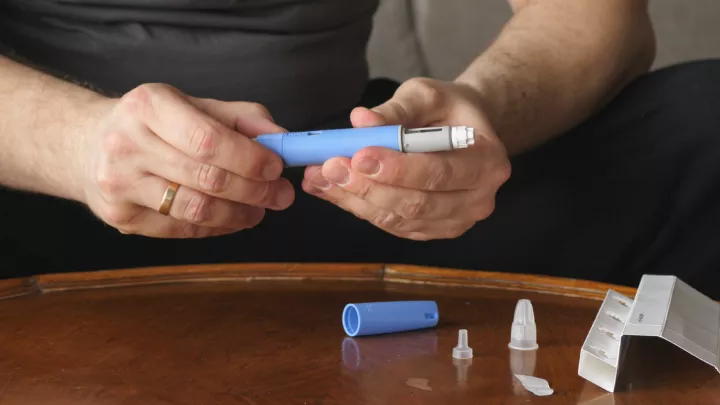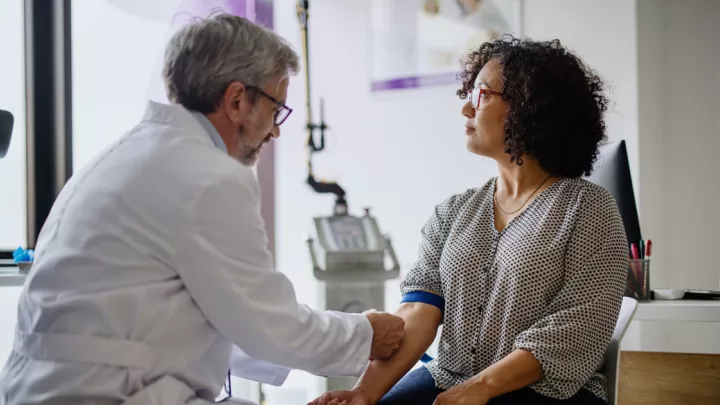FDA-approved fecal transplant therapy: What it is, what it treats and how it works

The U.S. Food and Drug Administration recently approved the latest fecal microbiota transplantation, or FMT, therapy product for recurrent Clostridioides difficile infection, also known as CDI or C. diff.
Yes, you read that correctly. With FMT, doctors basically take stool (poop) from a healthy donor and make it into a liquid mixture, transferring it into the colon of a C. diff infected person to reintroduce beneficial organisms back into the gut.
Formal approval was granted for Rebyota® for patients 18 years and older who have completed antibiotic treatment for recurrent CDI but had ineffective results.
What is a CDI or C. diff infection?
C. diff infects approximately 500,000 people in the U.S. yearly, and when severe, it can require hospitalization and may lead to death. About 1 in 5 patients who contract C. diff will get it again.
The infection can occur when a person is a carrier of the bacterium that can grow in the intestines and cause severe gastrointestinal symptoms. It can remain in the intestinal flora for quite some time and may become active when there are changes in the microbial flora.
A severe illness or a course of antibiotics can trigger activity, causing the dormant C. diff to grow and produce a toxin that damages the intestinal lining which leads to the inflammation. It’s estimated that up to 10% of people carry the bacteria without feeling symptoms but can still shed it through their stool.
C. diff is diagnosed via a stool sample. Symptoms may include:
- Abdominal pain or cramping
- Watery diarrhea
- Nausea
- Rectal bleeding
- Fever
- Weight loss
While most cases seem to develop after taking antibiotics, other risk factors include:
- Recent hospitalizations
- A weakened immune system
- Previous C. diff infection or known exposure
- Being over age 65
If you have had C. diff once, you are at high risk of contracting it again.
Once you’ve had a C. diff infection, a discussion with your doctor is essential before considering antibiotic treatment again – for any reason. This is especially vital for patients with inflammatory bowel disease.
“For example, when a person with IBD, particularly ulcerative colitis, gets this infection, it can reactivate the underlying bowel disease,” says gastroenterologist Peter Mannon, MD, director of Frederick F. Paustian Inflammatory Bowel Disease Center. “The infection needs to be treated first, and then we work hard to get the IBD back under control.”
How does a fecal transplant work? How long does it take?
Fecal transplant material is a mixture of gut microbes from an otherwise healthy donor. For a patient with recurrent C. diff, 150 ml (a bit more than half a cup of liquid) of the suspended mixture is given as a small enema in the doctor’s office. No gut prep is needed. The enema treatment is thought to repopulate the microbiota and control the growth of the infection.
In a successful transplant, symptoms should resolve anywhere from several days to two weeks.
Are fecal transplants safe? Are there side effects?
Although the fecal transplant concept is not new, the FDA now requires stool banks that provide FMT products to comply with IND requirements. For now, doctors can still use appropriately screened donor stool for patients with symptoms that aren’t responding to antibiotic therapies.
Donor stool is tested for a variety of transmissible pathogens. However, human fecal matter can still carry a risk of transmitting infectious material or allergens. Read more about safety and trials reported by the U.S. Food and Drug Administration.
Potential side effects are minor and may include bloating, abdominal discomfort, or the potential of a secondary infection.
FMT is not FDA-approved for patients with inflammatory bowel diseases such as Crohn’s or irritable bowel syndrome.
Who can provide FMT therapy?
FMT therapy is not recommended to do on your own. A primary care physician or gastroenterologist must administer the newly approved treatment.
“We are hopeful this product will help patients with recurring cases of this infection,” adds Dr. Mannon. “Fecal transplants are a well-known, successful approach to treating most cases of recurring C. diff. Nebraska Medicine is preparing for its availability and is eager to help patients bring resolution to their symptoms.”







